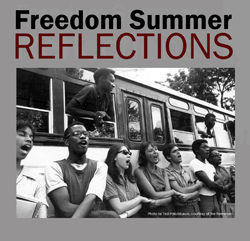
The 1964 Mississippi Freedom Summer was the shock treatment beginning of my real-world theological education.
Just after graduation from seminary, I was recruited by the National Council of Churches to serve as a project chaplain. Stationed in Holly Springs, I came to understand social sin—the systematic oppression by the “principalities and powers.”
That oppression included the ruthless intimidation of black Mississippians who wanted only to register to vote, “law enforcement” that operated to preserve white power by any means and the white church that defended segregation with theology, scripture and bullying tactics.
I tasted the deep fear that perpetuates evil, as three of our project volunteers had “disappeared” just as we left our week of training in Ohio. My own fear was most palpable when visiting white clergy while the police menacingly followed us around to their churches. No wonder some of the sharecroppers we visited were scared to talk with us about voting (though most, remarkably, were willing).
I also experienced first hand Christian resistance. Black churches, including some where I preached, courageously hosted movement meetings, despite dozens of church burnings that summer.
Black folks sang, “We shall overcome today,” and “This little light of mine, I’m gonna let it shine,” and “I want Jesus to walk with me,” with gusto and authority. They warmly embraced us volunteers, eagerly supported our Freedom Schools teaching black history, and dared to register to vote.
I’ll never forget how a black family invited us to a July 4th celebration on their farm that had more integrity and joy than any I have known. In short, they were raising signs and outposts of God’s Kin-dom in the very heart of the Domination System.
In Mississippi, I learned more deeply what “church” is: gathering to pray and sing, to hear the Word and renew one’s hope, to nurse one’s wounds from the struggle, and to again take up the cross for a new reality.
Our unsung Mississippi hosts modeled an embodied theology that has nourished me and countless others ever since in the struggles against domination, whether by patriarchy, apartheid, class oppression, heterosexism or the religious sanction of evil.
*McClain is executive director emeritus, Methodist Federation for Social Action Adjunct Faculty: New York Theological Seminary, The College of New Jersey.
News media contact: Kathy L. Gilbert, Nashville, Tenn., (615) 742-5470 or [email protected].
Like what you're reading? Support the ministry of UM News! Your support ensures the latest denominational news, dynamic stories and informative articles will continue to connect our global community. Make a tax-deductible donation at ResourceUMC.org/GiveUMCom.




